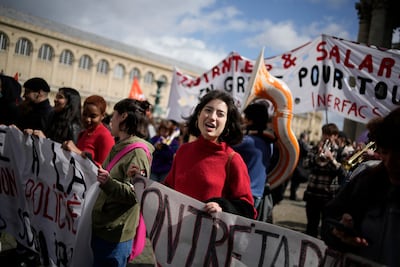Leaving Paris last week, in the midst of the pension reform strikes and demonstrations that began on January 19, I had to step between black bin bags stuffed with rubbish piling up. The elegant sixth arrondissement, the former home of Jean Paul Sartre, Simone de Beauvoir, Gertrude Stein and Ernest Hemingway, reeked of decayed food.
Meanwhile on the street, the young and old marched with red and white union flags and shouted into bullhorns. The much-feared French riot police, the Compagnies Republicaines de Securite kicked trash aside and marched with shields and crowd control guns. It looked like a war zone rather than the City of Light.
On March 24, during the tenth general strike this year, it reached a zenith: the unions reported that as many as 2 million people took to the streets (other reports said it was closer to 1 million). Businesses were shuttered; trains and subways were closed. Tourist sites – important for the post-Covid-19 economy – were off-limits. King Charles had to postpone his state visit. Getting across the river, from Left Bank to Right, was a military operation akin to George Washington crossing the Delaware.
Later, on television I heard one young protester cheerfully tell a reporter: “We are prepared to cripple the economy if necessary.”

At the heart of the French protests is President Emmanuel Macron’s vision of reform for France – raising the age of retirement from 62 to 64. Two years isn’t an enormous amount of time to keep working – in some cultures such as America, it would be shocking to retire at the youthful age of 62.
But in France, the dream of retirement begins early and keeps many workers – especially the manual workers who keep the country running and begin working young – focused on a better life as they age. Mr Macron has a different vision for his country other than leisure. Under intense pressure from all sides, he chose to push through the unpopular plan, which also annoyed the masses, betraying their sense of democratic values. He was portrayed as a leader who is scornful of the Republic. He is called by some King Emmanuel I.
But are the protests really about two years of work or are they about keeping the status quo? Mr Macron, 45, is a former investment banker and seeks to make France internationally competitive. He has plans for a greener economy, for sustainability, trade and growth.
Others do not want change. At the heart of what the protesters are calling for is a defence of France’s identity. Another young protester complained that because older generations had ruined the planet, they wanted early retirement so they could enjoy what little time is left. They say they are working for less money than their parents and fear that if retirement is raised, there will be no money left for when they retire. Mr Macron’s team, meanwhile, says that if you want to get things done, you have to go through growing pains.
It is true that the French don’t like change. Their culture, their language, their traditions are vital to their sense of identity. This has positive aspects – the beauty and allure of France is the many wonderful things that are uniquely French. Take the Puppets from the Luxembourg Gardens, the Theatre des Marionnettes du Jardin du Luxembourg, which has been alive since 1933, keeping generations of French children delighted, or the Academie Francaise, the chief watchdog of the French language. This is in stark contrast to my neighbourhood in Manhattan where every local business – from hardware shops to diners – are closed down to make way for eyelash extension boutiques, or another Starbucks.

Meanwhile, 3,000 miles away, demonstrations are also rocking Israel, and also concern identity. These protesters, too, fear for the erosion of Israel’s democracy because of Prime Minister Benjamin Netanyahu’s attempts to reform the judiciary. Now in his sixth term as prime minister, Mr Netanyahu is keen to hang on to power.
Among a raft of far-reaching proposals from Mr Netanyahu’s government are plans to allow a simple majority of 61 in the 120-seat Knesset to override almost any ruling of the supreme court, and to allow politicians to appoint most of the justices to the bench. Mr Netanyahu's allies are his Likud colleagues Yariv Levin, the justice minister, and Simcha Rothman, who chairs the Knesset’s law and justice committee.
Both men have a contempt for Israel’s supreme court, which they see as too powerful and biased against the settler movement, Israel’s ultrareligious community and the Mizrahi population – Jewish people of Middle Eastern origin.
Meanwhile, there is little talk of the occupation, now entering its 56th year – which last year was described by the UN Special Rapporteur for the situation of human rights in the Palestinian territory occupied since 1967, Michael Lynk, as apartheid.
The Palestinians have largely sat out the protests as these do not address the real issue in Israel – the occupation. The judicial system has never been on their side, but Mr Netanyahu's reforms would alienate them even further. They do not even have the right to exist as a people, according to the Israel's finance minister Bezalel Smotrich, a main pillar of Mr Netanyahu’s coalition.
To calm the streets (and international supporters), Mr Netanyahu has postponed the judicial overhaul. But he has not scrapped it, so the protests are likely to continue.
The protests are called “democracy protests” but are they really? B’Tselem, a human rights group in Israel last week posted images reading: Democracy for All. The protests are blind to the long-standing prejudice against the Palestinian people.
But the question is also, do protests really work? Can a million people shut down the French economy over the issue of retirement age by burning tires and shouting slogans?
In America, in the 1960s, mass protesters failed to end the much-loathed Vietnam War, or prevent the Iraq invasion in 2004. They failed to prevent Roe vs Wade from being scrapped.
On a positive note, Donald Trump and his Proud Boys failed to bring down the US government on January 6 using demonstrations and violent protests.
In the short term, some protests can scare governments into making changes. But in the case of Mr Macron and Mr Netanyahu, both defiant in the face of protests, and both committed to their policies, that may not happen.
What protests could do, however, is change the protesters themselves – especially the young. They can change the children who went to the yellow vest or gilets jaunes protests of 2018 to perhaps simply play hookey from school into lifelong activists. And perhaps, in the case of some, they will examine the real root of what is wrong with their country, and what actually might be changed for the better.


